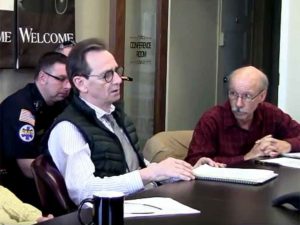Committee give initial OK to rules to regulate city’s short-term rentals
By JIM BROOKS
Nelson County Gazette / WBRT Radio
Sunday, March 12, 2017, 11:45 p.m. — The committee that’s charged with examining ways to best deal with the growing number of short-term rentals agreed Wednesday to forward a draft of proposed regulations to the full Planning Commission for review.

Larry Green, the city’s HR director, makes a point during the meeting of the committee formed to review possible regulations of short-term rentals in the city of Bardstown.
The short-term rentals phenomenon has exploded in popularity across the country, including in Bardstown. The rentals have grown in popularity partly due to a current shortage of quality housing in the Bardstown area for visitors coming to the community. It is their growing popularity that prompted formation of the committee, which is a subset of the planning commission’s regulations review committee.
But the increase in short-term rentals — often referred to as “AirBnbs,” named for the popular website often used to market them — has created a number of issues and concerns for planners and residents of the neighborhoods where short-term rentals are popping up.
Short-term rentals differ from a bed and breakfast because the rentals do not offer food service. A growing number of homes in and around the city’s historic district have been purchased and turned into short-term rentals.
One of the draft regulations that prompted considerable discussion by the committee is the requirement for the property owner to live at the property when it is rented.
The intent of the regulation is to protect the character of the neighborhood by avoiding short-term rentals operated by absentee landlords, though some on the committee felt the rule was too restrictive.
Tourism Director Dawn Prystal said most of the property owners who don’t live in their rentals live in the community and are available if there’s a problem at their rental. “That one clause seems excessive because we haven’t had any problems,” she said.
Committee member Pen Bogart said he favored the rule because it addresses the bigger issue of the potential impact of short-term rentals, which is commercialization of what was originally a residential neighborhood.
Short-term rentals would still be allowed, but rentals of an entire home would not be allowed in a residential area. The draft rules would prohibit renting more than 50 percent of a single-family home.
“By having the owner in the property, it doesn’t change the character of the neighborhood,” he said. “Its the commercialization of a neighborhood. It’s no different than a law office, except with a law office the same people are there every day.”
The demand to create more short-term rentals is taking smaller homes and starter homes in town off the market, Bogert said.
The residential areas of the downtown area — both inside and outside the historic district — are a small geographic area, and a concentration of short-term rentals could have a negative impact in neighborhoods where they locate.
Existing rental properties with commercial zoning will not be affected by the draft regulations, Johnston-Crowe said. The regulations are aimed at residential properties used for short-term rental.
Prystal said the demand for housing is driving the demand for more short-term rentals. “Once you see the new hotel properties come in I think we’ll see that demand level out,” she said.
All existing, approved short-term rentals would be grandfathered in and would not be affected by the new regulations. If the short-term rental property was sold to a new owner who wanted to continue to operate it as a short-term rental, the new rules would apply, Johnston-Crowe told the committee. The new owner would also be required to apply for a new conditional use permit.
REGULATING SHORT-TERM RENTALS. Another issue the committee discussed was how to limit the number of short-term rentals in the same area, and how many can be allowed without affecting the residential character of a neighborhood.
Johnston-Crowe said her office has fielded complaints from West Beall residents who have concerns with three potential short-term rentals in a two-block section.
“Where do we meet in the middle so we protect neighborhoods and still have diverse accommodations for our guests? That’s what we need to decide,” Johnston-Crowe said.
Nationally, local regulations on short-term rentals “are all over the place,” she told the committee.
Tim Butler, Bardstown city attorney and a former planning commission director, said downtown Bardstown’s longterm health has been tied to its residential neighborhoods around downtown. Local residents build relationships with local businesses and support local merchants.
“You could literally change the character (of our community) doing this,” he said, adding it would be a mistake to change the character of downtown and the community unless it was wanted.
Councilman Dick Heaton said he wasn’t comfortable with the restrictions as proposed, but said he hadn’t researched the issue thoroughly. He suggested the committee consider other options to fairly regulate the rentals.
FAIRNESS TO HOMEOWNERS. Bogert told the committee that the rules also protect existing homeowners who have invested their time and money to improve their homes and the have to watch their neighborhood become commercialized.
He recommended keeping the owner-occupied requirement for short-term rentals.
“I’m not in favor of prohibiting them,” he told the committee. “But I think it needs to be pretty strictly limited because of geography. We have a very small area.”
There are eight or nine already in the city’s historic district, with three more seeking approval soon, he said.
Larry Green, the city’s HR director, said he believed the city has the duty to protect homeowners’ investment in the city’s residential neighborhoods. Short-term rentals aren’t like other approved in-home business uses that can be allowed in a residential neighborhood; they represent a commercial encroachment on a residential neighborhood.
Butler told the committee that the draft regulations would be a starting point to try to regulate a new phenomenon like the short term rentals and AirBnB. The assumption is the regulations would be revised as evidence of the needed changes became clear.
The committee approved forwarding the draft regulations to the full Planning Commission. The commission will likely hold a public hearing on the regulations at its March 28 meeting.
NEXT UP. The planning commission will meet at 7 p.m. Tuesday, March 28, 2017, in the fiscal court meeting room on the second floor of the Old Court House.
-30-







